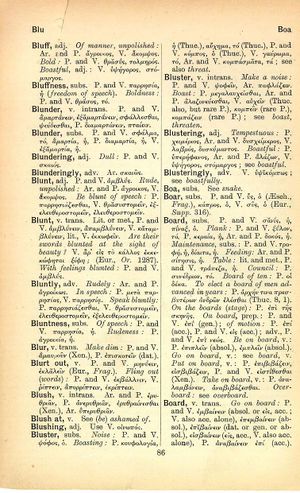boa
ὥσπερ γὰρ ζώου τῶν ὄψεων ἀφαιρεθεισῶν ἀχρειοῦται τὸ ὅλον, οὕτως ἐξ ἱστορίας ἀναιρεθείσης τῆς ἀληθείας τὸ καταλειπόμενον αὐτῆς ἀνωφελὲς γίνεται διήγημα → for just as a living creature which has lost its eyesight is wholly incapacitated, so if history is stripped of her truth all that is left is but an idle tale | for, just as closed eyes make the rest of an animal useless, what is left from a history blind to the truth is just a pointless tale
English > Greek (Woodhouse)
subs.
See snake.
Latin > English (Lewis & Short)
bŏa: (also bŏva in the MSS. of Pliny and Festus), ae, f. bos; cf. βουβών,
I a large Italian serpent: in Italiă appellatae bovae in tantam amplitudinem exeuntes ut divo Claudio principe occisae in Vaticano solidus in alvo spectatus infans, Plin. 8, 14, 14, § 37; 30, 14, 47, § 138 sq.; Sol. 2; acc. to Paul. ex Fest. p. 30 Müll., a water-serpent, so called because it milked cows, Sol. 2, 33; or because it could swallow an ox, quas boas vocant, ab eo quod tam grandes sint ut boves gluttire soleant, Hier. Vit. Hil. Erem. 39.—
II A disease producing red pustules, the measles or small-pox, Plin. 24, 8, 35, § 53: boam id est rubentes papulas. id. 26, 11, 73, § 120: boas fimum bubulum abolet: unde et nomen traxere, id. 28, 18, 75, § 244; Lucil. ap. Fest. s. v. tama, p. 360 Müll.—
III Crurum quoque tumor viae labore collectus bova appellatur, Paul. ex Fest. p. 30 Müll. (the same author explains with these words the disease tama).
Latin > French (Gaffiot 2016)
(1) bŏa (bŏva, bŏas), æ, m.,
1 le serpent boa : Plin. 8, 37
2 enflure des jambes par suite d’une marche pénible : P. Fest. 30 || rougeole [maladie] : Plin. 24, 53.
Latin > German (Georges)
(1) boa1 u. (urspr., aber archaist.) bova, ae, f. u. boba, ae, f., I) eine Art Wasserschlange, die sich gern an Kühe ansaugt, Form boa, Plin. 8, 37 u.a. Solin. 2. § 33 u. 34: Form bova, Varr. sat. Men. 329. Paul. ex Fest. 30, 13. Form boba, Plac. gloss. V, 8, 9. – II) übtr.: a) (Form boa) die durch Kuhmist zu heilende Krankheit der roten Blattern, die Wasern, franz. la rougeole, Plin. 24, 53 u.a.: Form boba, Placid. gloss. V, 8, 9. – b) (Form bova) die durch Gehen rot angeschwollenen Adern der Schenkel, Adergeschwulst, Lucil. sat. fr. inc. 39 (bei Fest. p. 360, 21 boa; bei Paul. ex Fest 30, 13 bova). – c) (Form bova) ein einer boa ähnliches Weingefäß, die Weinschlange, Varr. sat. Men. 329.

